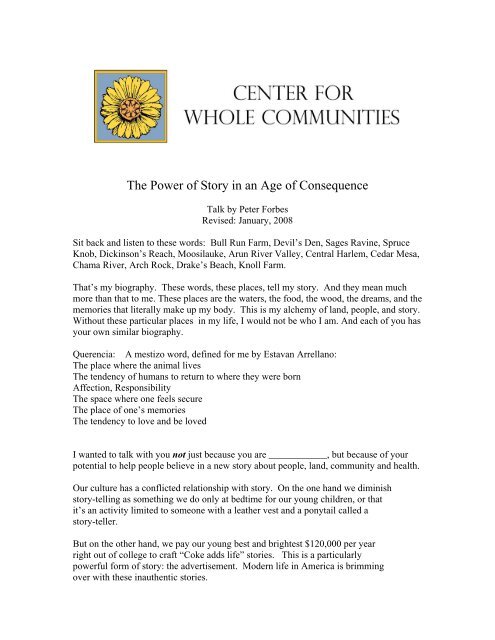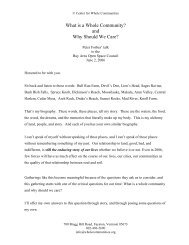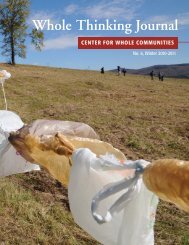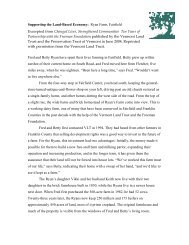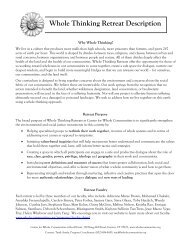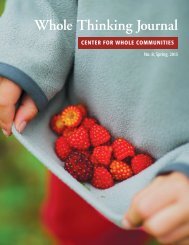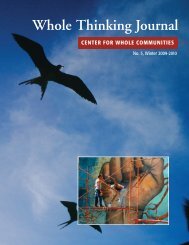The Power of Story in an Age of Consequence - The Center for ...
The Power of Story in an Age of Consequence - The Center for ...
The Power of Story in an Age of Consequence - The Center for ...
Create successful ePaper yourself
Turn your PDF publications into a flip-book with our unique Google optimized e-Paper software.
<strong>The</strong> <strong>Power</strong> <strong>of</strong> <strong>Story</strong> <strong>in</strong> <strong>an</strong> <strong>Age</strong> <strong>of</strong> <strong>Consequence</strong><br />
Talk by Peter Forbes<br />
Revised: J<strong>an</strong>uary, 2008<br />
Sit back <strong>an</strong>d listen to these words: Bull Run Farm, Devil’s Den, Sages Rav<strong>in</strong>e, Spruce<br />
Knob, Dick<strong>in</strong>son’s Reach, Moosilauke, Arun River Valley, Central Harlem, Cedar Mesa,<br />
Chama River, Arch Rock, Drake’s Beach, Knoll Farm.<br />
That’s my biography. <strong>The</strong>se words, these places, tell my story. And they me<strong>an</strong> much<br />
more th<strong>an</strong> that to me. <strong>The</strong>se places are the waters, the food, the wood, the dreams, <strong>an</strong>d the<br />
memories that literally make up my body. This is my alchemy <strong>of</strong> l<strong>an</strong>d, people, <strong>an</strong>d story.<br />
Without these particular places <strong>in</strong> my life, I would not be who I am. And each <strong>of</strong> you has<br />
your own similar biography.<br />
Querencia: A mestizo word, def<strong>in</strong>ed <strong>for</strong> me by Estav<strong>an</strong> Arrell<strong>an</strong>o:<br />
<strong>The</strong> place where the <strong>an</strong>imal lives<br />
<strong>The</strong> tendency <strong>of</strong> hum<strong>an</strong>s to return to where they were born<br />
Affection, Responsibility<br />
<strong>The</strong> space where one feels secure<br />
<strong>The</strong> place <strong>of</strong> one’s memories<br />
<strong>The</strong> tendency to love <strong>an</strong>d be loved<br />
I w<strong>an</strong>ted to talk with you not just because you are ____________, but because <strong>of</strong> your<br />
potential to help people believe <strong>in</strong> a new story about people, l<strong>an</strong>d, community <strong>an</strong>d health.<br />
Our culture has a conflicted relationship with story. On the one h<strong>an</strong>d we dim<strong>in</strong>ish<br />
story-tell<strong>in</strong>g as someth<strong>in</strong>g we do only at bedtime <strong>for</strong> our young children, or that<br />
it’s <strong>an</strong> activity limited to someone with a leather vest <strong>an</strong>d a ponytail called a<br />
story-teller.<br />
But on the other h<strong>an</strong>d, we pay our young best <strong>an</strong>d brightest $120,000 per year<br />
right out <strong>of</strong> college to craft “Coke adds life” stories. This is a particularly<br />
powerful <strong>for</strong>m <strong>of</strong> story: the advertisement. Modern life <strong>in</strong> America is brimm<strong>in</strong>g<br />
over with these <strong>in</strong>authentic stories.
For the 99.9% <strong>of</strong> hum<strong>an</strong> history that existed be<strong>for</strong>e the <strong>in</strong>dustrial age, be<strong>for</strong>e the<br />
steam-eng<strong>in</strong>e, be<strong>for</strong>e the radio, be<strong>for</strong>e nuclear power, be<strong>for</strong>e television <strong>an</strong>d<br />
IPODS, there was story. <strong>Story</strong> has always been the way we expla<strong>in</strong> our<br />
relationships <strong>an</strong>d who were are.<br />
This is the way I w<strong>an</strong>t you to th<strong>in</strong>k <strong>of</strong> story, the way story is expla<strong>in</strong>ed by the<br />
Nigeri<strong>an</strong> novelist Ben Okri:<br />
“Stories are the secret reservoir <strong>of</strong> our values: ch<strong>an</strong>ge the stories <strong>in</strong>dividuals <strong>an</strong>d<br />
nation live by <strong>an</strong>d tell themselves <strong>an</strong>d you ch<strong>an</strong>ge the <strong>in</strong>dividuals <strong>an</strong>d nations.<br />
Nations <strong>an</strong>d peoples are largely the stories they feed themselves. If they tell<br />
themselves stories that are lies, they will suffer the future consequences <strong>of</strong> those<br />
lies. If they tell themselves stories that face their own truths, they will free their<br />
histories <strong>for</strong> future flower<strong>in</strong>gs.”<br />
I must tell you what I know <strong>of</strong> the truth. Even your own org<strong>an</strong>izations – no matter what<br />
it is that they do-- c<strong>an</strong> not possibly do all the good that needs to be done right now <strong>in</strong> our<br />
communities. It is not possible <strong>for</strong> you, alone, to meet your own stated goals. <strong>The</strong>re are<br />
too m<strong>an</strong>y obstacles <strong>an</strong>d too little time <strong>for</strong> you to carry the burden <strong>of</strong> your work alone.<br />
Today, the task is to tr<strong>an</strong>slate the deep signific<strong>an</strong>ce <strong>of</strong> your work to this age <strong>of</strong><br />
consequence, so that there’s a world out there that knows, <strong>an</strong>d cares, <strong>an</strong>d responds.<br />
Our challenge is to help our neighbors <strong>an</strong>d ourselves to imag<strong>in</strong>e, <strong>an</strong>d then create, a<br />
different world. <strong>Story</strong> has the power to do that.<br />
I know some <strong>of</strong> you here today. You are successful people. You care about your<br />
missions. You work exceed<strong>in</strong>gly hard. You do exemplary work, but it is not sufficient.<br />
Here’s why. Today, our culture produces more malls th<strong>an</strong> high schools, more prisoners<br />
th<strong>an</strong> farmers, <strong>an</strong>d eats up the l<strong>an</strong>d with a similar appetite: 250 acres per hour. <strong>The</strong><br />
environmental educator David Orr tells us that the average Americ<strong>an</strong> child today c<strong>an</strong><br />
recognize 1,000 corporate logos but c<strong>an</strong>’t identify ten pl<strong>an</strong>ts or <strong>an</strong>imals native to his or<br />
her own region.<br />
And that powerful story is woven <strong>in</strong>to the 30,000 advertisements that reach our children<br />
each year. This spell says that the earth is a warehouse <strong>for</strong> our use, that nature is<br />
<strong>in</strong>exhaustible, that we have rights to it but no responsibilities, that noth<strong>in</strong>g has value that<br />
c<strong>an</strong>’t be converted <strong>in</strong>to money. This spell whispers to us hourly that the po<strong>in</strong>t <strong>of</strong> <strong>for</strong>ests<br />
is board feet, the po<strong>in</strong>t <strong>of</strong> farms is money, <strong>an</strong>d the po<strong>in</strong>t <strong>of</strong> people is to be consumers.<br />
This spell has fattened our pocketbooks <strong>an</strong>d lengthened our lives, but it has also created a<br />
d<strong>an</strong>gerous <strong>an</strong>d deeply unfair world <strong>of</strong> haves <strong>an</strong>d have-nots, <strong>an</strong>d pathology <strong>of</strong><br />
disconnection <strong>an</strong>d alienation. One evidence <strong>of</strong> this disconnection is that 25% <strong>of</strong> all<br />
Americ<strong>an</strong>s now experience serious cl<strong>in</strong>ical depression dur<strong>in</strong>g their lifetime. And if your<br />
©Peter Forbes<br />
<strong>Center</strong> <strong>for</strong> Whole Communities<br />
www.wholecommunities.org<br />
2
family <strong>in</strong>come is over $150,000 a year, the <strong>in</strong>cidence <strong>of</strong> <strong>an</strong>xiety <strong>an</strong>d depression is even<br />
higher. Is this Americ<strong>an</strong> dream br<strong>in</strong>g<strong>in</strong>g us progress or ext<strong>in</strong>ction?<br />
Let me go further. M<strong>an</strong>y <strong>of</strong> the exact th<strong>in</strong>gs that def<strong>in</strong>e the healthy hum<strong>an</strong> experience are<br />
threatened today by this story.<br />
• Our ability to judge between what is real <strong>an</strong>d what is artificial<br />
• Our sense <strong>of</strong> our spiritual or metaphysical place <strong>in</strong> the “big picture”<br />
• Our sense <strong>of</strong> belong<strong>in</strong>g<br />
• Our sense <strong>of</strong> toler<strong>an</strong>ce/ accept<strong>an</strong>ce <strong>of</strong> other life<br />
<strong>The</strong> writer <strong>an</strong>d ecologist, Robert Michael Pyle, co<strong>in</strong>ed the phrase “ext<strong>in</strong>ction <strong>of</strong><br />
experience” <strong>in</strong> his import<strong>an</strong>t book <strong>The</strong> Thunder Tree. He writes:<br />
People who care conserve; people who don’t know don’t care. What is the<br />
ext<strong>in</strong>ction <strong>of</strong> the condor to a child who has never known the wren?”<br />
People who don’t know don’t care. What is the ext<strong>in</strong>ction <strong>of</strong> the condor to a child who<br />
has never known the wren?<br />
<strong>The</strong> child who doesn’t know the wren is the child who is afraid <strong>of</strong> walk<strong>in</strong>g to school, the<br />
child who has already begun to feel boundaries surround her. And, <strong>of</strong> course, this child is<br />
a symbol <strong>of</strong> the greater pathos <strong>of</strong> disconnection that m<strong>an</strong>y <strong>of</strong> us feel.<br />
What’s the role <strong>of</strong> story, then, <strong>in</strong> turn<strong>in</strong>g around this situation?<br />
<strong>The</strong> best example I c<strong>an</strong> <strong>of</strong>fer is to rem<strong>in</strong>d you that Mart<strong>in</strong> Luther K<strong>in</strong>g did not say, “I<br />
have a pl<strong>an</strong>”. He said I have a dream, <strong>an</strong>d he spoke <strong>of</strong> his deepest values without<br />
<strong>of</strong>fer<strong>in</strong>g strategy <strong>an</strong>d tactics about how we might get to his dream. He knew that if he<br />
could reach people with shared values then he could respect them to move <strong>in</strong> the right<br />
directions <strong>of</strong> their own accord. Dr. K<strong>in</strong>g didn’t <strong>of</strong>fer dreamy “happy talk” that was<br />
sugary or unrealistically optimistic. He showed hi respect <strong>for</strong> the Americ<strong>an</strong> people by<br />
tell<strong>in</strong>g them the truth <strong>an</strong>d know<strong>in</strong>g they could h<strong>an</strong>dle it. He appealed not to their self<strong>in</strong>terest,<br />
but to their community-<strong>in</strong>terest.<br />
For those <strong>of</strong> us who care about people <strong>an</strong>d place, our most import<strong>an</strong>t work may be to<br />
look at the world honestly <strong>an</strong>d compassionately <strong>an</strong>d to re-discover our own prophetic<br />
voices. None <strong>of</strong> us are likely to become <strong>an</strong>other Dr. K<strong>in</strong>d, but every one <strong>of</strong> us c<strong>an</strong> f<strong>in</strong>d<br />
<strong>an</strong>d share the stories we need right now to guide us. We need these stories to help us reth<strong>in</strong>k<br />
what it me<strong>an</strong>s to be hum<strong>an</strong> today.<br />
We c<strong>an</strong>not restore l<strong>an</strong>d without re-story<strong>in</strong>g culture. What I me<strong>an</strong> is this: one c<strong>an</strong><br />
certa<strong>in</strong>ly restore a wetl<strong>an</strong>d or protect a <strong>for</strong>est, but that place will be degraded <strong>in</strong> the future<br />
if there are not people who feel connected to it, who tell stories about it, who love it.<br />
©Peter Forbes<br />
<strong>Center</strong> <strong>for</strong> Whole Communities<br />
www.wholecommunities.org<br />
3
Environmentalists have made a strategic error <strong>in</strong> assum<strong>in</strong>g that our work is more a legal<br />
act th<strong>an</strong> a cultural act, assum<strong>in</strong>g we c<strong>an</strong> protect l<strong>an</strong>d from people through laws as<br />
opposed to with people through relationships. Laws codify values, not create them. If the<br />
people <strong>in</strong> a democracy no longer care about the l<strong>an</strong>d, the laws that protect that l<strong>an</strong>d will<br />
not hold. <strong>The</strong> massive, vital work <strong>of</strong> conservation today is to reweave this still<br />
spectacular l<strong>an</strong>dscape with the hum<strong>an</strong> experience, relat<strong>in</strong>g l<strong>an</strong>d to everyday hum<strong>an</strong><br />
choice <strong>an</strong>d life.<br />
Your long term success as ch<strong>an</strong>ge-agents will come not solely through a reli<strong>an</strong>ce on<br />
<strong>in</strong><strong>for</strong>mation, pl<strong>an</strong>s, <strong>an</strong>d data, but on your heart-felt use <strong>of</strong> story. Our dreams c<strong>an</strong> easily be<br />
drowned by our facts<br />
Let me expla<strong>in</strong> why I th<strong>in</strong>k is is true.<br />
<strong>The</strong> world’s environmental crisis is really a crisis <strong>of</strong> values, a crisis over what it me<strong>an</strong>s to<br />
be hum<strong>an</strong>. Our work may be guided by the natural/biological sciences, but the source <strong>of</strong><br />
the problem lies <strong>in</strong> the social sciences: the yearn<strong>in</strong>gs <strong>of</strong> the hum<strong>an</strong> heart <strong>an</strong>d soul. And so<br />
though we may be ecologists, our work must speak directly to the hum<strong>an</strong> heart. And let<br />
me go further --<strong>an</strong>d I know this will make some <strong>of</strong> you squirm-- I propose that we must<br />
also speak <strong>of</strong> our faith. Not religion, but faith.<br />
What do we really have faith <strong>in</strong> today?<br />
In these pr<strong>of</strong>essional circles, we rarely speak <strong>of</strong> our values because they’re perceived as<br />
s<strong>of</strong>t <strong>an</strong>d we need to be hard. We rarely tell stories, because we th<strong>in</strong>k our job is to prove<br />
th<strong>in</strong>gs <strong>an</strong>d you c<strong>an</strong>’t prove a story. And we don’t speak <strong>of</strong> what we have faith <strong>in</strong>,<br />
because we are afraid <strong>of</strong> religion.<br />
And, honestly, lead<strong>in</strong>g with one’s values is lead<strong>in</strong>g with one’s ch<strong>in</strong>. It’s not a safe place<br />
is it? If you lead with your values, you will be vulnerable; you will risk mak<strong>in</strong>g<br />
com<strong>for</strong>table relationships uncom<strong>for</strong>table. You will risk trust<strong>in</strong>g others. <strong>The</strong>re’s the risk<br />
that you will be mis<strong>in</strong>terpreted <strong>an</strong>d taken adv<strong>an</strong>tage <strong>of</strong>, rejected. You risk be<strong>in</strong>g ridiculed<br />
<strong>an</strong>d marg<strong>in</strong>alized.<br />
It’s the difficulty <strong>of</strong> speak<strong>in</strong>g about nu<strong>an</strong>ce <strong>in</strong> a culture <strong>of</strong> pound<strong>in</strong>g fists <strong>an</strong>d elevator<br />
pitches. But there are enormous successes: when you lead with your values, you provoke<br />
what is real <strong>an</strong>d genu<strong>in</strong>e, you demonstrate your moral voice, <strong>an</strong>d you will actually grow<br />
<strong>an</strong>d ch<strong>an</strong>ge. Through putt<strong>in</strong>g our values first, you will lead from beh<strong>in</strong>d <strong>an</strong>d achieve<br />
more th<strong>an</strong> you ever thought because others will be drawn to you.<br />
And so m<strong>an</strong>y <strong>of</strong> my heroes, (Rachel Carson, Arundhati Roy, Wendell Berry) perhaps<br />
your heroes as well, have led with their values, <strong>an</strong>d moved nations by their faith.<br />
I worry that we are hid<strong>in</strong>g beh<strong>in</strong>d our five year pl<strong>an</strong>s <strong>an</strong>d our budgets <strong>an</strong>d our strategies<br />
<strong>an</strong>d action pl<strong>an</strong>s, because it’s easy <strong>an</strong>d safer th<strong>an</strong> speak<strong>in</strong>g our values.<br />
©Peter Forbes<br />
<strong>Center</strong> <strong>for</strong> Whole Communities<br />
www.wholecommunities.org<br />
4
<strong>Story</strong>, my friends, is the way we gently speak <strong>of</strong> our values.<br />
Let me tell you what, <strong>in</strong> my view, stories are <strong>an</strong>d aren’t.<br />
Stories help us to imag<strong>in</strong>e the future differently <strong>an</strong>d thereby ch<strong>an</strong>ge the way we<br />
act <strong>in</strong> the world.<br />
Stories are easily understood by different people, so they help us to communicate<br />
<strong>an</strong>d to open to the claims <strong>of</strong> others. <strong>Story</strong> helps us see through the eyes <strong>of</strong> other<br />
people, <strong>an</strong>d to cross the borders that separate us from one <strong>an</strong>other.<br />
Stories help us dwell <strong>in</strong> time, <strong>an</strong>d help us to deal with suffer<strong>in</strong>g, loss <strong>an</strong>d death.<br />
Stories teach us empathy, <strong>an</strong>d how to be hum<strong>an</strong>. We tell stories to reveal our<br />
most authentic selves, <strong>an</strong>d to pull ourselves toward our most authentic selves.<br />
Gene Knudsen H<strong>of</strong>fm<strong>an</strong> once said that <strong>an</strong> enemy is one whose story we have not yet<br />
heard.<br />
We pay a steep price <strong>for</strong> the lack <strong>of</strong> story <strong>in</strong> our lives: it leads to fear <strong>of</strong> one <strong>an</strong>other, to<br />
lonel<strong>in</strong>ess, no shared values, the fact that it’s harder <strong>an</strong>d harder to talk to one <strong>an</strong>other.<br />
Without stories, there are only strategies <strong>an</strong>d tactics. And <strong>in</strong> such a world, we are less<br />
th<strong>an</strong> whole; we are brittle, competitive, <strong>an</strong>d prone to exaggeration.<br />
<strong>Story</strong> is more th<strong>an</strong> <strong>in</strong><strong>for</strong>mation, which tends to be about data <strong>an</strong>d numbers.<br />
<strong>Story</strong> is ultimately about relationship.<br />
And relationship is def<strong>in</strong>ed by the daily choices we make between fear <strong>an</strong>d love.<br />
Politici<strong>an</strong>s use fear <strong>an</strong>d, quite honestly, so do environmentalists. Environmentalists use<br />
fear by focus<strong>in</strong>g on what people will lose. vironmentalists talk mostly about what they<br />
are aga<strong>in</strong>st <strong>an</strong>d what they fear, <strong>an</strong>d less about what they are <strong>for</strong>.<br />
<strong>The</strong> work <strong>of</strong> <strong>Center</strong> <strong>for</strong> Whole Communities is to lead a conceptual revolution by mak<strong>in</strong>g<br />
these ideas real <strong>in</strong> the bone <strong>an</strong>d muscle <strong>of</strong> today’s movements <strong>for</strong> ch<strong>an</strong>ge.<br />
We welcome to Knoll Farm hundreds <strong>of</strong> very different leaders: urb<strong>an</strong> gardeners,<br />
r<strong>an</strong>chers, wilderness advocates, tribal chiefs, hum<strong>an</strong> rights workers, teachers, writers,<br />
biologists, <strong>an</strong>d make it safe to have conversations about what’s work<strong>in</strong>g <strong>an</strong>d not work<strong>in</strong>g,<br />
<strong>an</strong>d to discover what might immerge that is bigger th<strong>an</strong> the sum <strong>of</strong> our <strong>in</strong>dividual work.<br />
We teach that relationship is as fundamental as places <strong>an</strong>d th<strong>in</strong>gs.<br />
We teach that you c<strong>an</strong>’t dem<strong>an</strong>d a different world, you have to <strong>in</strong>spire it. Today’s most<br />
import<strong>an</strong>t work is not about mak<strong>in</strong>g m<strong>an</strong>ifestos <strong>an</strong>d dem<strong>an</strong>d<strong>in</strong>g ch<strong>an</strong>ge, but releas<strong>in</strong>g <strong>in</strong><br />
the population what’s already there.<br />
©Peter Forbes<br />
<strong>Center</strong> <strong>for</strong> Whole Communities<br />
www.wholecommunities.org<br />
5
We build bridges: we teach that it’s possible to look across the divides <strong>of</strong> our nation <strong>an</strong>d<br />
to recognize new allies.<br />
F<strong>in</strong>ally, we teach the need <strong>for</strong> a new story that helps people to f<strong>in</strong>d their way out <strong>of</strong> the<br />
old story.<br />
This new story is filled with m<strong>an</strong>y different faces. It is about aspirations, not limitations.<br />
It’s about gratitude <strong>for</strong> how beautiful this l<strong>an</strong>d still is, not <strong>an</strong>ger alone <strong>for</strong> what’s been lost<br />
or squ<strong>an</strong>dered. This new story is <strong>in</strong> a l<strong>an</strong>guage everyone c<strong>an</strong> underst<strong>an</strong>d, <strong>an</strong>d encourages<br />
our neighbor to rise to the challenge, to be heroic <strong>in</strong> their own way.<br />
It is a story that people c<strong>an</strong> visualize, <strong>of</strong> a mission-accomplished. It’s a story that redef<strong>in</strong>es<br />
wealth as be<strong>in</strong>g about relationships not money. This new story is about justice<br />
<strong>an</strong>d fairness ... toward one <strong>an</strong>other <strong>an</strong>d then toward all species <strong>of</strong> life.<br />
This story is as much about listen<strong>in</strong>g as it is about speak<strong>in</strong>g.<br />
This new story embraces ch<strong>an</strong>ge, is made up <strong>of</strong> m<strong>an</strong>y short stories, always unfold<strong>in</strong>g <strong>an</strong>d<br />
slow to be heard. It is one we will tell our children, <strong>an</strong>d they will tell their children, <strong>an</strong>d<br />
their children, <strong>an</strong>d their children.<br />
<strong>The</strong> new story will always be challenged, <strong>an</strong>d will ch<strong>an</strong>ge over <strong>an</strong>d over aga<strong>in</strong> until<br />
everyone recognizes it as their own.<br />
This new story is told <strong>in</strong> the fields, <strong>in</strong> m<strong>in</strong>es, on you-tube, <strong>in</strong> b<strong>an</strong>ks, <strong>an</strong>d beg<strong>in</strong>s with the<br />
question, What c<strong>an</strong> we grow <strong>in</strong>to?<br />
<strong>The</strong> big work is to listen <strong>for</strong> <strong>an</strong>d to re-tell this new story, <strong>an</strong>d the best way to do that is to<br />
sit down with someone you are afraid <strong>of</strong> <strong>an</strong>d tell them who you are, <strong>an</strong>d let them tell you<br />
who they are.<br />
A Ritual to Read to Each Other<br />
by William Staf<strong>for</strong>d (1960)<br />
If you don’t know the k<strong>in</strong>d <strong>of</strong> person I am<br />
<strong>an</strong>d I don’t know the k<strong>in</strong>d <strong>of</strong> person you are<br />
a pattern that others made may prevail <strong>in</strong> the world<br />
<strong>an</strong>d follow<strong>in</strong>g the wrong god home we may miss our star.<br />
For there is m<strong>an</strong>y a small betrayal <strong>in</strong> the m<strong>in</strong>d,<br />
a shrug that lets the fragile sequence break<br />
send<strong>in</strong>g with shouts the horrible errors <strong>of</strong> childhood<br />
storm<strong>in</strong>g out to play through the broken dyke.<br />
And as eleph<strong>an</strong>ts parade hold<strong>in</strong>g each eleph<strong>an</strong>t’s tail,<br />
but if one w<strong>an</strong>ders the circus won’t f<strong>in</strong>d the park.<br />
©Peter Forbes<br />
<strong>Center</strong> <strong>for</strong> Whole Communities<br />
www.wholecommunities.org<br />
6
I call it cruel <strong>an</strong>d maybe the root <strong>of</strong> all cruelty<br />
to know what occurs but not recognize the fact.<br />
And so I appeal to a voice, to someth<strong>in</strong>g shadowy,<br />
a remote import<strong>an</strong>t region <strong>in</strong> all who talk:<br />
though we could fool each other, we should consider –<br />
lest the parade <strong>of</strong> our mutual life get lost <strong>in</strong> the dark.<br />
For it is import<strong>an</strong>t that awake people be awake,<br />
or a break<strong>in</strong>g l<strong>in</strong>e may discourage them back to sleep;<br />
the signals we give – yes, no, or maybe –<br />
should be clear: the darkness around us is deep.<br />
Let me show you what I me<strong>an</strong> by <strong>in</strong>troduc<strong>in</strong>g you to my friend, Classie Parker.<br />
Classie’s a third generation resident <strong>of</strong> 121 first street. She grew up <strong>in</strong> the same build<strong>in</strong>g<br />
<strong>of</strong>f Frederick Douglas Boulevard where her mother was born. Classie didn’t aspire to be<br />
<strong>an</strong> activist <strong>an</strong>d didn’t have a gr<strong>an</strong>d vision about runn<strong>in</strong>g a community program. She was<br />
flipp<strong>in</strong>g hamburgers at White Castle <strong>an</strong>d th<strong>in</strong>k<strong>in</strong>g about her mom <strong>an</strong>d dad who were<br />
grow<strong>in</strong>g old <strong>an</strong>d needed a way to work <strong>an</strong>d be outside. Classie got the radical idea to<br />
turn the vac<strong>an</strong>t lot alongside her apartment build<strong>in</strong>g <strong>in</strong>to a garden. That was almost ten<br />
years ago <strong>an</strong>d today Classie produces food, beauty, toler<strong>an</strong>ce, <strong>an</strong>d a relationship to l<strong>an</strong>d<br />
<strong>for</strong> more th<strong>an</strong> 500 families <strong>in</strong> central Harlem. Five Star Garden is almost absurdly small,<br />
just a quarter acre, but <strong>for</strong> the people <strong>of</strong> 121st Street—who, <strong>for</strong> the most part, never leave<br />
Harlem—the garden is their own piece <strong>of</strong> l<strong>an</strong>d to which they have developed a very deep<br />
personal attachment. <strong>The</strong>se are Classie’s words:<br />
We th<strong>in</strong>k <strong>of</strong> ourselves as farmers, city farmers. Never environmentalists.<br />
Don’t call me <strong>an</strong> environmentalist. We love people <strong>an</strong>d pl<strong>an</strong>ts; we love be<strong>in</strong>g<br />
with the earth, work<strong>in</strong>g with the earth. <strong>The</strong>re is someth<strong>in</strong>g here <strong>in</strong> this garden <strong>for</strong><br />
everyone. And <strong>an</strong>y race, creed, or color . . . now, c<strong>an</strong> you expla<strong>in</strong> that? This is<br />
one <strong>of</strong> the few places <strong>in</strong> Harlem where they c<strong>an</strong> be free to be themselves. It’s hard<br />
to put <strong>in</strong>to words what moves people to come <strong>in</strong> this garden <strong>an</strong>d tell us their life<br />
stories, but it happens every day. <strong>The</strong>re’s love here. People gonna go where they<br />
feel the flow <strong>of</strong> love.<br />
<strong>The</strong>re is a difference. You come <strong>in</strong> here <strong>an</strong>d sit down, Peter— don’t you<br />
feel com<strong>for</strong>table with us? Don’t you feel you’re free to be you? That we’re not<br />
go<strong>in</strong>g to judge you because you’re a different color or because you’re a male? Do<br />
you feel happy here? Do you feel <strong>in</strong>timidated? Don’t you feel like my dad’s your<br />
dad?<br />
Classie boiled it all down: “Don’t you feel like my dad’s your dad?” I remember laugh<strong>in</strong>g<br />
a bit nervously as Classie said this because I wasn’t prepared <strong>for</strong> her c<strong>an</strong>dor <strong>an</strong>d<br />
hopefulness. I paused just a moment, <strong>an</strong>d then looked up at her father, sitt<strong>in</strong>g ten feet<br />
across from me with his feet firmly pl<strong>an</strong>ted on the earth, both h<strong>an</strong>ds rest<strong>in</strong>g on c<strong>an</strong>es,<br />
eighty-seven years old, garden dirt on his face. “Don’t you feel like my dad’s your dad?”<br />
©Peter Forbes<br />
<strong>Center</strong> <strong>for</strong> Whole Communities<br />
www.wholecommunities.org<br />
7
Pass<strong>in</strong>g one <strong>an</strong>other on the street, our eyes might not have met long enough to see one<br />
<strong>an</strong>other’s hum<strong>an</strong>ity. But there on that patch <strong>of</strong> earth, what we had <strong>in</strong> common at that<br />
moment was pr<strong>of</strong>ound: it was the soil, that place, the love <strong>an</strong>d hope that Classie held <strong>for</strong><br />
us, <strong>an</strong>d the awareness that my own pulse beat <strong>in</strong> his throat.<br />
This is the soul <strong>of</strong> the l<strong>an</strong>d. It is also the soul <strong>of</strong> our country; the empathetic soul that I<br />
believe is there wait<strong>in</strong>g to be spoken to. This is the generosity, patience, respect <strong>an</strong>d<br />
<strong>in</strong>clusiveness that comes naturally to m<strong>an</strong>y Americ<strong>an</strong>s. You know these stories, too,<br />
because they are your stories.<br />
Your work c<strong>an</strong> br<strong>in</strong>g <strong>in</strong>to people’s moral universe a renewed sense <strong>of</strong> fairness, belong<strong>in</strong>g,<br />
me<strong>an</strong><strong>in</strong>g, respect, joy <strong>an</strong>d love. I know this soul <strong>of</strong> America thrives.<br />
<strong>The</strong>re is, <strong>of</strong> course, <strong>an</strong>other soul to this country that is more <strong>of</strong>ten <strong>in</strong> our face. It’s the<br />
unfairness <strong>of</strong> toxic dumps <strong>in</strong> places where the people have less power <strong>an</strong>d control; it’s<br />
the exploitation <strong>of</strong> shav<strong>in</strong>g-<strong>of</strong>f mounta<strong>in</strong> tops <strong>for</strong> cheap energy; it’s the m<strong>an</strong>ia <strong>of</strong><br />
pollut<strong>in</strong>g our natural water systems while simult<strong>an</strong>eously creat<strong>in</strong>g expensive markets <strong>for</strong><br />
bottled water.<br />
Both <strong>of</strong> these souls <strong>of</strong> our country get played out on the l<strong>an</strong>d itself. Our sense <strong>of</strong><br />
<strong>for</strong>bear<strong>an</strong>ce, respect, love <strong>of</strong> diversity, appreciation <strong>of</strong> beauty, our very nurtur<strong>an</strong>ce as a<br />
culture is represented <strong>in</strong> the national parks, healthy farms <strong>an</strong>d homesteads, sacred<br />
mounta<strong>in</strong>s, wildlife refuges, wild l<strong>an</strong>ds <strong>an</strong>d l<strong>an</strong>d trusts <strong>of</strong> our nation.<br />
Which story will prevail? Which story will our children come to know as their story <strong>of</strong><br />
America?<br />
<strong>The</strong> people <strong>of</strong> India who have been try<strong>in</strong>g to protect the Narmada River have a say<strong>in</strong>g<br />
that goes “You c<strong>an</strong> wake someone who is asleep, but you c<strong>an</strong> not wake someone who is<br />
pretend<strong>in</strong>g to be asleep.”<br />
Our stories must wake the people who are afraid <strong>an</strong>d pretend<strong>in</strong>g to be asleep, <strong>an</strong>d we c<strong>an</strong><br />
only do that through empathy, compassion <strong>an</strong>d love … not fear.<br />
My friend Mary Evelyn Tucker writes that “what we seek (today) is a me<strong>an</strong>s <strong>for</strong> walk<strong>in</strong>g<br />
the ridge between the evident destruction <strong>an</strong>d the emerg<strong>in</strong>g creativity <strong>of</strong> our times.”<br />
As they say <strong>in</strong> AA, “our best th<strong>in</strong>k<strong>in</strong>g got us here.” I say let this be a time <strong>of</strong> great<br />
creativity, a time to give birth to new ideas, new relationships, new <strong>in</strong>stitutions. It is the<br />
occasion <strong>for</strong> each <strong>of</strong> us, <strong>in</strong> our own ways, to beg<strong>in</strong> a journey to a new place. <strong>The</strong> poet<br />
lariat <strong>of</strong> Alaska, John Ha<strong>in</strong>es, wrote, “Every journey beg<strong>in</strong>s with a place to start from <strong>an</strong>d<br />
someth<strong>in</strong>g to leave beh<strong>in</strong>d.” If your prefer Bob Dyl<strong>an</strong>, this is what he had to say on the<br />
matter: “Whoever isn’t busy be<strong>in</strong>g born is busy dy<strong>in</strong>g.”<br />
©Peter Forbes<br />
<strong>Center</strong> <strong>for</strong> Whole Communities<br />
www.wholecommunities.org<br />
8
Let’s leave beh<strong>in</strong>d our fear <strong>an</strong>d our desire to adequately <strong>an</strong>d compell<strong>in</strong>gly describe the<br />
problem, <strong>an</strong>d beg<strong>in</strong> the journey <strong>of</strong> re-imag<strong>in</strong><strong>in</strong>g a different future. Be patient, there is no<br />
roadmap <strong>for</strong> where we are today.<br />
Some walls grow higher each year, it’s true. But others crumble down. Stories help us to<br />
take the steps toward one <strong>an</strong>other <strong>an</strong>d toward a new dream.<br />
It’s our stories about people <strong>an</strong>d place that help a great deal to crumble down the walls.<br />
<strong>The</strong> stories you tell about the good relationships resonate with all hum<strong>an</strong>s more loudly,<br />
more courageously, <strong>an</strong>d more joyfully that <strong>an</strong>yth<strong>in</strong>g else we could ever legislate,<br />
negotiate or protect.<br />
©Peter Forbes<br />
<strong>Center</strong> <strong>for</strong> Whole Communities<br />
www.wholecommunities.org<br />
9


